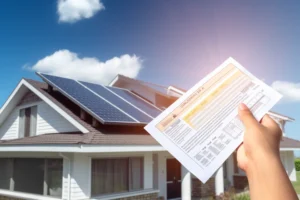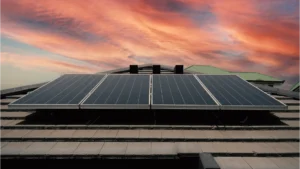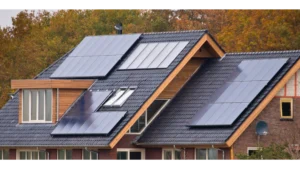
As the world becomes increasingly aware of the need to transition to sustainable energy sources, residential solar panel systems have become a popular investment for homeowners. Apart from contributing to the fight against climate change, installing a solar panel system can also lead to significant financial benefits through cost savings and potential income from selling excess energy back to the grid. However, before investing in such a system, it is crucial to understand its return on investment (ROI).
In this article, we will explore what ROI For A Residential Solar Panel System means in the context of residential solar panel systems and the factors that affect it. We will also provide real-life examples of ROI calculations for different types of systems and offer tips on maximizing your ROI For A Residential Solar Panel System. Additionally, we will examine the long-term benefits and potential drawbacks of investing in a residential solar panel system and alternative financing options available for those who cannot afford upfront costs. By understanding these aspects of residential solar panels’ ROI, homeowners can make informed decisions about whether or not to invest in such a system while pursuing their desire for freedom from dependence on fossil fuels and traditional energy sources.
The comprehension of return on investment for solar panel systems is fundamental in determining the profitability of such installations. This concept is usually expressed as a percentage, indicating the amount of money earned compared to the initial investment made in the system. The ROI calculation considers several factors: installation costs, maintenance fees, and electricity savings.
Understanding solar incentives can play a significant role in determining the ROI For A Residential Solar Panel System. Governments worldwide offer various rebates, grants, and tax credits to incentivize homeowners to switch to renewable energy sources. Incentives can vary depending on location and utility companies; therefore, it’s essential to research available programs before deciding on solar panel installations.
Another factor that impacts ROI For A Residential Solar Panel System is solar panel financing options. Homeowners have several choices when it comes to financing their solar panel installations. Some options include cash payments, leases, power purchase agreements (PPAs), loans from financial institutions or government agencies like FHA Title I, or Property Assessed Clean Energy (PACE).
Understanding the intricacies of calculating ROI For A Residential Solar Panel System requires a technical and analytical approach considering several variables unique to each homeowner’s situation. Therefore It’s an imperative first step towards going green by evaluating whether installing a home-based renewable energy source would be profitable over its lifetime while also considering possible incentives and financing options available in your region.
Various factors can impact the ROI For A Residential Solar Panel System. One of the most significant factors is installation costs, which can vary depending on the system’s size and the installation’s complexity. Generally speaking, larger systems with more panels will cost more to install than smaller ones. However, it’s important to remember that investing in a larger system may result in greater savings over time.
Another factor that affects ROI for residential solar panel systems is energy consumption. Homes with higher energy consumption tend to see a faster return on investment than those with lower consumption levels. This is because they require more electricity, which means they’ll be able to offset their electricity bills by a larger amount each month.
The location also plays an important role in determining the ROI For A Residential Solar Panel System installations. In areas with high electricity rates or significant incentives for renewable energy use, homeowners can expect a relatively quick investment payoff period. On the other hand, if electricity rates are low and there aren’t many incentives available, it may take longer to recoup the initial investment.
Several factors influence the ROI For A Residential Solar Panel System, including installation costs, energy consumption levels, and location-specific incentives or regulations. Homeowners considering installing these systems should carefully evaluate all relevant information before deciding whether such an installation will be financially beneficial over time. However, with careful planning and research beforehand, homeowners can make informed choices that lead to long-term financial savings while enjoying cleaner and greener energy sources at home.
When evaluating the financial benefits of installing solar panels at home, one critical aspect to consider is determining the return on investment (ROI) for this renewable energy source. Calculating ROI For A Residential Solar Panel System is important in conducting a comprehensive financial analysis of residential solar panel systems. This can help homeowners determine if the upfront costs associated with installation are worth it and whether they will receive a satisfactory return on their investment.
To calculate your ROI For A Residential Solar Panel System, you need to consider several factors, such as the cost of installation, incentives that may be available, and savings from reduced energy bills. The following list outlines some key steps involved in calculating ROI:
Calculating the ROI For A Residential Solar Panel System is essential for making informed decisions about investing in renewable energy sources like solar power. By considering all relevant factors and utilizing accurate data-driven analysis techniques, homeowners can make sound financial choices while contributing to a cleaner environment and greater energy independence.
Real-world examples of financial analysis involving the installation of photovoltaic modules on residential properties showcase how homeowners can achieve substantial savings over time. These case studies provide valuable insights into residential solar panel systems’ actual return on investment (ROI). One such example is a family in California that installed a 12 kW solar panel system, which generated an average monthly energy production of 1,754 kWh. The system cost $42,000, and they received a federal tax credit of $12,600. They also qualified for a state rebate of $8,400 and a utility rebate of $4,800. After factoring in these incentives and the annual electricity bill savings, their payback period was approximately four years.
Another example is Colorado, where a couple installed a 5 kW solar panel system at home for around $14,000 after rebates and credits. They generated an average monthly energy production of 700 kWh and saved roughly $85 per month on their electricity bill. Their payback period was approximately nine years without considering any potential increase in electricity prices over time.
A third real-life example is from Massachusetts, where a homeowner installed an 8 kW solar panel system that cost approximately $26,000 after incentives. The system generated an average monthly energy production of 928 kWh and saved them about $120 per month on their electricity bill. Their payback period was around eight years without considering any future price increases.
These examples demonstrate that residential solar panels can benefit homeowners financially over the long term despite high upfront costs. Before deciding whether to invest in solar panels, homeowners should consider various factors, such as regional incentives, available sunlight hours, and local regulations. Nonetheless, real-life examples show that investing in photovoltaic modules may provide greater returns than traditional investments while reducing carbon footprint too!
To optimize the financial benefits of investing in photovoltaic technology, it is crucial for homeowners to carefully consider factors such as energy consumption patterns, available roof space, and local solar resources when selecting a solar power solution. Choosing the right size of solar panel system is essential to maximize ROI For A Residential Solar Panel System. A system that is too small may not generate enough electricity to meet the household’s needs, while an oversized system may result in unused energy production. Homeowners should evaluate their current and future energy usage to determine the appropriate size of their solar panel system.
Evaluating different financing options can also help homeowners maximize theirROI For A Residential Solar Panel System. Purchasing a solar panel system outright may provide the greatest long-term savings but requires a significant upfront investment. Alternatively, leasing or entering into a power purchase agreement (PPA) can allow homeowners to enjoy immediate cost savings without paying upfront for equipment and installation. However, these options may result in lower overall savings over time due to ongoing lease or PPA payments.
In addition to choosing the right size and financing option for their solar panel system, homeowners should also consider other factors that can impact ROI For A Residential Solar Panel System. For example, selecting high-quality panels with efficient conversion rates can increase energy production and reduce maintenance costs. Additionally, working with experienced installers who use best practices can ensure that the system is installed correctly and operates efficiently.
Overall, maximizing ROI For A Residential Solar Panel System requires careful consideration of various factors such as sizing requirements, financing options, equipment quality, and installation practices. By considering these factors when selecting a solar power solution, homeowners can enjoy significant cost savings while reducing their carbon footprint and contributing towards a more sustainable future.
Investing in a residential solar panel system can provide various long-term benefits. One of the significant advantages is environmental benefits, as it reduces carbon emissions and dependence on non-renewable energy sources. Furthermore, installing solar panels could increase home value and attract potential buyers seeking sustainable homes. Finally, it promotes energy independence by generating clean energy that can power your household and reduce your reliance on the grid.
The installation of residential solar panel systems contributes to a reduction in greenhouse gas emissions and promotes sustainable energy production. Here are some environmental benefits that come with investing in a residential solar panel system:
Overall, investing in a residential solar panel system provides long-term financial benefits and contributes significantly towards creating a cleaner environment by reducing greenhouse gas emissions and promoting sustainable energy production from renewable sources like sunlight.
Increased home value is a significant advantage that comes with the installation of solar panels on residential properties. Research has shown that homes with solar panels have higher market values than those without. A study by the National Renewable Energy Laboratory found that homes with solar panels sell for an average of 17% more than those without. This increase in value is due to several factors, including increased energy efficiency and the growing demand for sustainable living.
The appraisal process also plays a crucial role in determining the value of a property equipped with solar panels. Appraisers must now consider the amount of energy the solar panel system generates when determining home values. As such, homeowners who invest in solar panel systems can expect an increase in their property values during their next appraisal. Additionally, as renewable energy becomes increasingly popular, homes with solar panels will likely continue to appreciate over time, making them a smart investment choice for environmentally-conscious homeowners looking to save money on energy bills while increasing their home’s worth.
Achieving energy independence through using sustainable resources is crucial to reducing our carbon footprint and preserving the planet for future generations. One way to achieve this is by adopting renewable energy sources such as solar power. Residential solar panel systems have become increasingly popular in recent years because they are environmentally friendly and offer homeowners a sense of independence from traditional utility companies.
Off-grid living has become a desirable lifestyle choice for many individuals seeking to reduce their reliance on fossil fuels and decrease their carbon footprint. A residential solar panel system can provide enough energy to sustain a household without relying on external power grids. It allows homeowners to live off the grid entirely or simply reduce their dependence on traditional energy providers. The cost savings associated with generating one’s electricity can be significant over time, making renewable energy solutions an attractive option for those seeking long-term financial benefits while contributing positively to the environment.
One possible drawback of residential solar panel systems is the potential decline in efficiency over time due to weather conditions and material wear and tear. While solar panels are designed to withstand various environmental stressors, they may still be vulnerable to damage caused by extreme weather events, such as hailstorms or hurricanes. In addition, regular maintenance is required to ensure that the panels are functioning optimally. Failure to maintain the system could result in a decrease in energy output.
Another disadvantage of residential solar panel systems is their reliability. The performance of a solar panel system depends on many factors, including the orientation and tilt angle of the panels, shading from trees or buildings, and temperature variations. Even slight changes in these variables can significantly affect the system’s energy output. As a result, homeowners may experience fluctuations in their energy production, which could impact their ability to achieve energy independence.
Despite these potential drawbacks, investing in a residential solar panel system can be financially beneficial for homeowners. Homeowners can save money on utility bills over time by reducing their reliance on traditional energy sources and generating electricity through renewable means. In addition, some states offer tax incentives or rebates for installing solar panels.
While there are some disadvantages associated with residential solar panel systems, such as maintenance requirements and reliability issues due to external factors like variable weather conditions – it’s important not to overlook the benefits that come with this investment: financial savings on utility bills over time and potential financial incentives from state governments for those who install them on their property. It’s also worth noting that technological advancements will likely continue improving upon these types of renewable energy solutions – making them even more reliable and efficient for homeowners seeking greater independence from traditional power generation sources!
Financing options for installing solar panels on residential properties are available through various financial institutions and government programs. These financing options can help homeowners overcome the high upfront costs of purchasing and installing a solar panel system. One popular option is to lease the solar panels from a third-party provider, who will install and maintain the system on behalf of the homeowner.
Solar panel leasing options allow homeowners to enjoy the benefits of solar energy without bearing the burden of high upfront costs. With leasing, homeowners pay a monthly fee for using the solar panel system rather than paying it outright. The lease period typically lasts between 15-20 years, during which homeowners can enjoy reduced electricity bills while contributing to a greener environment.
Another popular financing option is through government-backed programs such as Property Assessed Clean Energy (PACE) financing. PACE financing allows homeowners to finance renewable energy projects such as solar panel systems through their property tax bill. This means that payments are spread out over several years and only paid when property taxes are due, making it an attractive option for those looking to reduce their carbon footprint while maintaining financial stability.
Numerous alternative financing options are available to homeowners interested in installing solar panels on their residential properties. Leasing options provide an affordable way for individuals to access clean energy without high upfront costs. At the same time, government-backed programs like PACE offer longer-term payment plans that make it easier for homeowners to invest in renewable energy projects. With these options available, more people can take advantage of this sustainable technology and contribute towards creating a cleaner future for all.
In conclusion, the ROI for a residential solar panel system depends on various factors such as location, energy usage, installation costs, and incentives. Homeowners must carefully analyze their energy consumption patterns and choose the right system to maximize their returns. While there are initial costs involved in installing solar panels, the long-term benefits of reduced electricity bills and a lower carbon footprint make it a worthwhile investment. However, homeowners must also be aware of potential drawbacks, such as maintenance costs and risks associated with weather events.
To ensure maximum ROI, homeowners should consider financing options such as loans or leasing agreements that may offer better terms than paying upfront. Additionally, choosing reputable installers who provide quality equipment and warranties can help mitigate potential risks associated with solar panel systems. Overall, investing in a residential solar panel system can offer significant financial and environmental benefits while helping to reduce reliance on traditional fossil fuels.
Lifespan estimation for residential solar panel systems varies between 25-30 years, depending on climate and maintenance. Maintenance costs may include cleaning and occasional repairs. Solar power provides energy independence and financial freedom for homeowners.
A residential solar panel system can increase home value by providing energy independence and reducing environmental impact. Studies show an average increase of $15,000 in home value for homes equipped with solar panels, making it a worthwhile investment for homeowners seeking both financial and environmental benefits.
The geographical location of a home can significantly impact solar panel efficiency and subsequent return on investment (ROI). Factors such as sunlight intensity, weather patterns, and energy costs must be considered when determining the viability of a residential solar panel system.
Tax credit eligibility and installation costs are important when investing in a residential solar panel system. Various federal, state, and local incentives can significantly reduce the upfront installation cost, resulting in a more favorable return on investment over time.
Electricity cost impact and local weather factors significantly influence the ROI of a residential solar panel system. A technical, data-driven analysis is essential to accurately determine the potential returns on investment. These factors should be carefully considered for those seeking freedom from traditional energy sources.

How Do I Calculate The Amount Of Energy I Need To Power My Home With Solar Panels? Share: Facebook Twitter LinkedIn Pinterest Solar energy as

Will I Still Receive A Utility Bill If I Have Solar Panels Installed? Share: Facebook Twitter LinkedIn Pinterest The installation of solar panels has become

Will Installing Solar Panels Increase The Value Of My Home? Share: Facebook Twitter LinkedIn Pinterest As energy prices continue to rise, homeowners are increasingly looking

Selling a Home with Solar Panels: A Complete Guide Share: Facebook Twitter LinkedIn Pinterest Can I Sell My Home With Solar Panels Installed The rise

The Amazing Benefits of Residential Solar Panels Share: Facebook Twitter LinkedIn Pinterest One of the most compelling advantages of residential solar panels is the potential

Advantages Residential Solar Panels Share: Facebook Twitter LinkedIn Pinterest The phrase “power to the people” is more than just an idiom – it’s a way